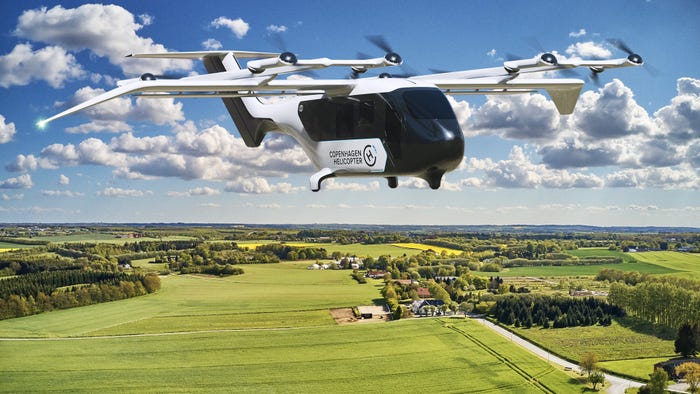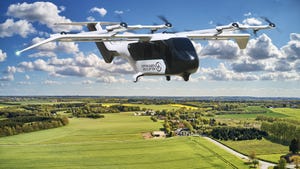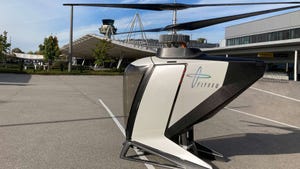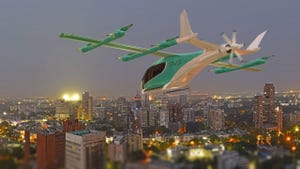Flying Taxi Company Gets $50M from CitibankFlying Taxi Company Gets $50M from Citibank
The new financing adds to the $95.6 million in equity financing from a group of industrial companies and investors

Air taxi company Eve Air Mobility has received a $50 million loan from Citibank to support the research and development program of the eVTOL (electric vertical takeoff and landing) vehicle company.
The new financing adds to the recently announced $95.6 million in equity financing from a group of industrial companies and investors in July.
Eve Air also recently secured $88 million in a loan from the Brazil National Development Bank (BNDES) to fund the development of the electric aerial vehicle (EAV) maker.
That loan was for the manufacturing facility in Taubaté, in São Paulo, Brazil, following its partnership with BNDES, which in 2022 provided a line of credit for Eve’s eVTOL development program.
“Eve continues to attract new investors, a sign of the continued confidence in our strategic plan, strong customer interest in our eVTOL aircraft, services, operations solutions and our Vector urban air traffic management software solution,” said Eduardo Couto, chief financial officer at Eve Air Mobility.
“The bank loan, along with existing cash and credit lines, ensures that Eve remains well capitalized with a comfortable balance sheet and with one of the highest cash runways in the advanced air mobility (AAM)industry. We are continuing to advance in the development and manufacturing of our eVTOL.”
The funding of electric flying vehicles has made news recently.
German EAV jet maker Lilium announced it is facing insolvency after the company was denied a $54 million loan guarantee it was seeking from the government of Bavaria.
Vertical Aerospace, a U.K. based eVTOL vehicle maker, has been offered a $75 million financing deal from its main creditor.
Flying taxi company Joby Aviation announced a public offering of common stock expecting to raise $202 million for the EAV maker.
Aside from funding issues, the development of electric flying vehicles is well underway.
For example, Eve Air recently introduced a full-scale eVTOL prototype at the Farnborough Airshow in the U.K. and completed the selection of the primary suppliers for its EAV prior to entering its testing phase.
The Eve eVTOL vehicle uses eight propellers for vertical flight and fixed wings to fly on cruise, with no change of component positions for flight, and has a range of 60 miles.
The test phase includes flight capabilities and safety features for Eve, which has pre-orders for 2,900 of its electric flying vehicles, according to the company.
Eve Air funding includes a $94 million investment from several investors, including Embraer, the main backer of Eve Air, and a $20 million investment from Nidec Aerospace, the maker of its electric propulsion system. That investment s part of the Nidec strategy to supply products such as chargers for EAVs.
Eve Air also is working with Embraer and Groupe ADP to prepare for EAV operations at Paris-Le Bourget Airport, including updating airport facilities by adding training, maintenance and ground services for eVTOL vehicles.
For more flying vehicle and other embedded tech news subscribe to our free newsletter!
The company came out of Embraer’s business and innovation accelerator and has been working to create a low-sound vehicle with efficient thrust.
The Eve Air flying taxi is expected to enter service in 2026, with the company leveraging Embraer’s experience of developing, designing and certifying aircraft.
It is expected that Eve would use Embraer’s global network of service and support locations.
Eve Air also has an order for up to 50 of its EAVs from the largest helicopter air charter service in Japan as AirX Inc. signed a letter of intent to purchase 10 EAVs with an option to purchase 40 more and announced the launch of the Greater Tokyo Area’s first eVTOL test field, the urban air mobility (UAM) Center.
In addition to Japan, Eve is working with customers in Australia, India and South Korea.
Eve Air and UrbanX in Miami plan to launch eVTOL commuter flights throughout South Florida by 2026, when the first 10 Eve flying vehicles are planned for delivery.
GlobalX agreed to purchase 200 flying vehicles from Eve Air in 2022 and established UrbanX as a subsidiary of GlobalX.
The Florida flights are intended to help commuters navigate short distances and avoid traffic congestion and improve travel times.
Road travel times in Miami can be challenging because of delays caused by the frequent opening of numerous draw bridges as boats navigate through the many channels.
The electric flying service in Florida is subject to approvals from the Federal Aviation Administration (FAA) and Department of Transportation.
Eve Air also is growing arrangements with low-cost carriers, such as its deal with Flynas, a low-cost airline in Saudi Arabia, to explore starting eVTOL services in Riyadh and Jeddah.
Eve Air and Korean airline Jeju Air, the largest low-cost airline in Korea, also have plans for EAV use on Jeju Island.
Eve Air also has been working with cities, countries and regulatory authorities to establish concepts of operations in the U.S., Brazil and the U.K.
Read more about:
Flying CarsAbout the Author
You May Also Like








